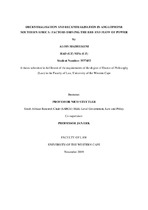| dc.description.abstract | Literature on multilevel government is replete with the virtues of decentralisation as a governing model. As a result, the discourse of decentralisation has found its way into the constitutions, legislation and policy documents of most African states, including those that are ostensibly centralised. However, the enthusiasm for the juridical form of decentralisation is not reflected when it comes to the actual distribution of state power. In practice, the distribution of power ebbs and flows as states hover between decentralisation and centralisation. In other words, regardless of juridical commitments, states hardly ever promote decentralisation consistently, but move between cycles of decentralisation and recentralisation. Thus, once reforms that promote decentralisation have been adopted, they are shortly followed by a wave of recentralisation, which lasts until it in turn, is replaced by a further push for decentralisation. Consequently, the cycles are repeated. The central quest of this study is to explain the factors driving this cyclical pattern. It raises the following questions: Why are states seldom consistent with respect to decentralisation? What drives decentralisation? What drives recentralisation? What does this mean for the future of decentralisation? A comparative study of five Anglophone countries in Southern Africa was conducted with a view to analyse the waves of decentralisation and recentralisation both within and across countries over long periods of time. The countries were chosen in terms of their similar historical background and regional concentration. They are the countries of Botswana, Malawi, Namibia, South Africa and Zimbabwe. The study traced the process of decentralisation in these countries from the precolonial and colonial period up until 2019, examining historical, legal, constitutional, economic and political documentation and scholarship. In some cases, in-depth interviews with key informants were conducted to supplement evidence collected through desk-top research. The central argument of this study is that ruling elites are rational actors who make calculated moves based on external and internal pressures, threats to their power, and opportunities to increase it. Evidence from the five countries under study indicate that governments always prefer to centralise power and would maintain the status quo until a political or economic crisis arises. Such crises tend to open up spaces in which other actors are able to negotiate for decentralisation. These other actors include opposition political parties, minority ethnic groups and donors. However, because decentralisation is driven by crisis resolution negotiations, it faces challenges at the implementation stage, and this is always accompanied by a fresh wave of recentralisation. In the wake of this vicious cycle, it is concluded that decentralisation can be sustained if measures are put in place to contain the reverse wave of recentralisation and its unravelling effects. The measures include constitutional protection, the strengthening of the rule of law, good governance at local levels, and support from political parties. | en_US |

